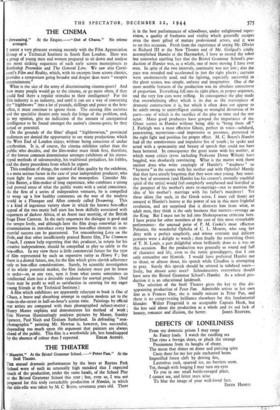THE THEATRE
" Hamlet." At the Bristol Grammar School.—" Peter Pan." At the Stoll Theatre.
Tag annual dramatic performances by the boys at Baynes Park School were of such an unusually high standard that I expected much of the production, under the same hands, of the School Play at the Bristol Grammar School this year ; but, even so, I was not prepared for this truly remarkable production of Hamlet, in which the tide-role was taken by M. C Boyes, seventeen years old. There is in the best performances of schoolboys, under enlightened super- vision, a quality of freshness and vitality which generally escapes even the most gifted of mature professional actors, and it was so on this occasion. Fresh from the experience of seeing Mr. Olivier as Richard III at the New Theatre and of Mr. Gielgud's coldly accomplished Hamlet at the Haymarket, I have to record the sober but somewhat startling fact that the Bristol Grammar School's pro- duction of Hamlet was, as a whole, one of most moving I have ever seen. In spite of the two intervals, continuity was not lost ; also the pace was retarded and accelerated in just the right places ; curtains were unobtrusively used, and the lighting, especially successful in the ghost scenes, was simple, unfussy and imaginative. One of the most notable features of the production was its absolute correctness of proportion. Everything fell into its right place, in proper sequence, and the very few cuts were trifling. In consequence the play made that overwhelming effect which is its due as the masterpiece of dramatic construction it is, but which it often does not appear to be solely owing to unintelligent cutting or wrongful distortion of its parts—one of which is the sacrifice of the play to time and the star actor. Many good producers have grasped the importance of the Ghost scenes in Hamlet without being able to "bring them off." J. Farleigh was a most effective Ghost, perfect in voice—subdued, penetrating, mysterious—and impressive in presence, presented in the right light and position for proper effect. M. C. Boyes's Hamlet had all the sensitiveness and impulsive fire of youth ; he spoke and acted with a spontaneity and beauty of speech that could not have been bettered. In consequence the great scene with his mother, at which many critics (even including Professor Dover Wilson) have boggled, was absolutely convincing. What is the matter with those ancient dons who write carpingly of Hamlet's " madness " or " hysteria " in the scenes with his mother and with Ophelia? Merely that they have utterly forgotten that they were once young. Any sensi- tive boy of seventeen (and Hamlet has his creator's eternally youthful spirit of the artist) would feel completely nonplussed and horrified at the prospect of his mother's mere re-marriage—not to mention the idea of his mother's marriage with his father's murderer! Yet these idiots (for such, in the Greek sense, I must call them) are amazed at Hamlet's horror at the power of sex in this most frightful revelation, and are surprised that it distracts him from what, as adult men, they think is the only business that matters—revenge on the King. But I must not be led into Shakespearean criticism here. I have praise for other members of the cast of this most remarkable performance: the unusual poise of P. M. Cooke's most effective Polonius, the wonderful Ophelia of C. L. Mearns, who sang her ditty with a perfect simplicity, and whose restraint and delicate gestures were a delight to watch ; then finally the astonishing Osric of T. N. Louis, a part delightful when brilliantly done as it was on this occasion. But the production was generally so sound and full of character and life, even to the rustic gravediggers, that I can only remember one blemish. I would have preferred Hamlet not to shout, or almost shout, his speech while Claudius is attempting to pray. Surely this speech should be uttered in subdued tones— lively, but almost sotto voce? Schoolmasters everywhere should have seen the Bristol Grammar School's Hamlet. As a school pro- duction it is an educational landmark.
The selection of the Stoll Theatre gives the key to this dis- appointing production of Peter Pan. Admirable artiste in her own line as is Frances Day, she is totally miscast as Peter Pan, and there is no compensating brilliance elsewhere for this fundamental blunder- Walter Fitzgerald is an acceptable Captain Hook, but the less said about the production as a whole and its sad lack of beauty, romance and illusion, the better. JAMES REDFERN.


























 Previous page
Previous page